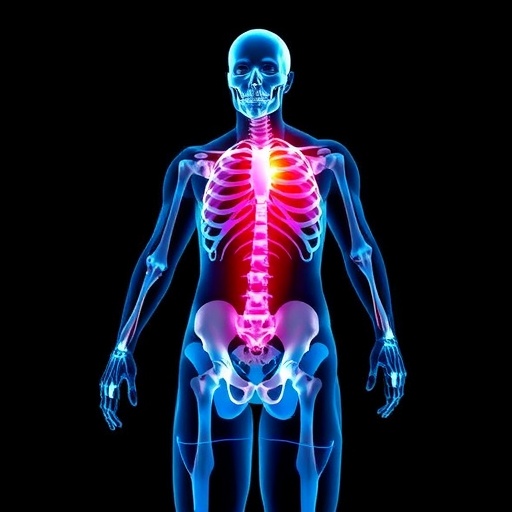Groundbreaking research has illuminated a critical intersection between sarcopenia and knee osteoarthritis, particularly in older populations. The study, conducted by an expert team led by Li, N., Dong, G., and Lu, Y., presents compelling evidence regarding the predictive value of the Ishii test in assessing sarcopenia among elderly patients suffering from knee osteoarthritis. This intersection of conditions raises substantial concerns for health professionals and caregivers alike, as both sarcopenia and knee osteoarthritis can drastically impact the quality of life and functional status of aging individuals.
Sarcopenia, characterized by progressive loss of muscle mass and strength, has become a focal point of geriatric research, garnering attention due to its significant contributions to morbidity in older adults. On the other hand, knee osteoarthritis—a degenerative joint disease—affects millions worldwide and is particularly prevalent in the aging demographic. The newfound connection between these two debilitating conditions underscores a pressing need for effective screening tools capable of identifying those at risk and providing targeted intervention.
The Ishii test, primarily designed for evaluating sarcopenia, has gained traction for its straightforward application in clinical settings. This test focuses on key indicators such as muscle mass and strength, which are critical in determining a patient’s risk for sarcopenia. The current study capitalized on this test, exploring its predictive accuracy specifically within a cohort of older adults suffering from knee osteoarthritis. This novel approach has the potential to transform how clinicians identify at-risk populations, ultimately leading to timely interventions.
At the heart of the research lies an extensive cohort study involving diverse participants, which enhances the reliability of the findings. Participants’ demographics—a mix of age, sex, and body mass index—were carefully considered to ensure representativeness. The rigorous methodology employed in this study aimed to eliminate biases and control for confounding variables. This attention to detail is crucial, as it establishes a more accurate understanding of the relationship between sarcopenia and knee osteoarthritis.
The significance of the findings cannot be overstated. By establishing the Ishii test as a reliable predictor for sarcopenia in patients with knee osteoarthritis, the authors have not only contributed to the body of knowledge regarding these conditions but have also highlighted essential implications for clinical practice. The results suggest that early identification of sarcopenia may lead to more effective management strategies for patients suffering from knee osteoarthritis, ultimately mitigating the decline in function and independence that these conditions can precipitate.
Clinicians often encounter challenges in diagnosing sarcopenia due to its subtle onset. The implications of overlooking sarcopenia in older adults are dire and include increased risk of functional decline, falls, and hospitalizations. By integrating the Ishii test into routine assessments for patients with knee osteoarthritis, healthcare providers can improve their diagnostic capabilities and subsequently enhance the overall quality of life for their patients.
As healthcare systems worldwide increasingly focus on preventive measures and early interventions, the findings of this research align with broader trends in geriatric care. Proactive screening for sarcopenia in knee osteoarthritis patients may facilitate tailored exercise programs and nutritional strategies—critical components in the fight against sarcopenia. This evidence-based approach not only offers a pathway toward improved patient outcomes but also embodies a shift toward holistic care models that prioritize comprehensive health assessments.
Moreover, the research team’s work reinforces the importance of interdisciplinary collaboration. Effective treatment plans for sarcopenia and knee osteoarthritis often involve a range of specialists, including physical therapists, nutritionists, and geriatricians. By fostering communication between these professionals, a more coordinated approach to management can be developed, ensuring that patients receive the multifaceted care they require.
While this study is groundbreaking, it also opens the door for future research opportunities. Questions remain regarding the long-term predictive validity of the Ishii test and its applicability to other forms of arthritis and musculoskeletal disorders. Future studies could expand on this initial research to explore the role of additional screening tools and interventions, thereby building a more comprehensive understanding of sarcopenia in various patient populations.
Furthermore, as the world grapples with an aging population, the urgent need for effective strategies to combat the ramifications of sarcopenia and osteoarthritis becomes increasingly vital. Policymakers and healthcare institutions must consider the implications of such research on broader public health initiatives. By integrating findings like those in this study into national health policies, significant improvements in the management of older adults with chronic conditions could be achieved.
The broader societal implications of these findings also merit discussion. As individuals age, their ability to maintain independence largely depends on their physical health and mobility. The intersection of sarcopenia and knee osteoarthritis exemplifies how compounded health issues can erode quality of life. Intervening early with screening tools like the Ishii test empowers both patients and healthcare providers to prioritize health and mobility amid the aging process.
In conclusion, the research conducted by Li, N., Dong, G., and Lu, Y. presents a watershed moment in understanding the relationship between sarcopenia and knee osteoarthritis in older adults. With the Ishii test serving as a promising predictive tool, healthcare providers are poised to make strides in managing these intertwined conditions. This crucial work not only sets the stage for improved clinical practices but also emphasizes the need for future research to expand on our understanding of these significant issues affecting the aging population.
Subject of Research: Predictive value of the Ishii test for sarcopenia in older patients with knee osteoarthritis.
Article Title: Predictive value of Ishii test for sarcopenia in older patients with knee osteoarthritis.
Article References:
Li, N., Dong, G., Lu, Y. et al. Predictive value of Ishii test for sarcopenia in older patients with knee osteoarthritis..
BMC Geriatr 25, 755 (2025). https://doi.org/10.1186/s12877-025-06343-4
Image Credits: AI Generated
DOI: 10.1186/s12877-025-06343-4
Keywords: Sarcopenia, Knee Osteoarthritis, Ishii test, Elderly patients, Predictive value, Geriatric health.




